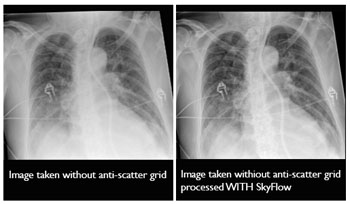Philip’s SkyFlow Removes the Grid in Mobile Radiography
|
By MedImaging International staff writers Posted on 19 Mar 2014 |

Image: SkyFlow offers a novel technology that combines the ease of a gridless acquisition workflow with contrast like a grid image. Results include superb image quality with less handling (Photo courtesy of Philips Healthcare).

Image: Duncan Porter, head of field marketing for imaging systems EMEA for Philips Healthcare (Photo courtesy of Philips Healthcare).
SkyFlow, a breakthrough innovation in image processing for mobile radiography, is one of the major new product introductions from Philips Healthcare (Best, The Nedherlands) at this year’s ECR.
“It’s all about providing quality and economic value to customers,” said Duncan Porter, Head of Field Marketing for Imaging Systems EMEA for Philips Healthcare in an interview with Medical Imaging International. “SkyFlow is gridless so it provides superb image quality with less handling by the operator.”
Traditionally in mobile chest radiography, grids have been used to ensure optimal image quality but the downside of using grids is that mAs-exposure values need to be adjusted to accommodate for them. “These adjustments lead to challenges around grid cut off, positioning, and the need to repeat examinations,” said the former radiographer.
In delivering the new algorithm, SkyFlow removes the need to have a grid in mobile chest X-rays, which account for approximately 70% of examinations performed outside a radiology department. Grids reduce the amount of scatter radiation that hits the detector, but by using SkyFlow algorithms, the radiographer can predict and remove the scatter radiation without the need for a grid, streamlining workflow and reducing dose. “This is how we are revolutionizing mobile X-ray from where we are today,” Mr. Porter pointed out.
He added that this not only reduced dose to the patient but it rapidly increased productivity in diagnostic imaging because the radiographer does not have to repeat the examination due to grid cut off, movement of the grid, or a lack of alignment between detector and X-ray tube.
SkyFlow is a variable part of Philip’s premium mobile digital radiography system MobileDiagnost wDR Release 2. This system enables radiographers to bring premium image quality outside the radiology room to special care baby units, wards, intensive care units, or resuscitation departments.
“With the Mobile Diagnost wDR, Philips has also launched a new size detector which is designed to fit inside incubators and makes emergency radiography much easier where the patient may be in a challenging position,” said Mr Porter. The detector is 24 by 30 cm, 1.8 kg; and the larger device is 35 x 43 cm at 2.6 kg.
Furthermore, the SkyPlate detectors used in the latest release of the Mobile Diagnost wDR can be integrated to an existing solution so analogue customers can leap into the premium DR solution with an integrated seamless solution from a single vendor. This is extremely good news for customers as Philips has the largest install base globally of analogue bucky systems.
The ProGrade retrofit upgrade has been developed with direct customer and clinical requirements. With the complex challenges and financial impact of hospital-acquired infections then the highest levels of sterility are important, stated Mr Porter. “The SkyPlate solution utilizes secure Wi-Fi technology versus tethered wired solutions significantly reducing the risk of hospital acquired infections.” The customizable solution extends the digital radiology portfolio from Philips and it has been launched at ECR for immediate shipment within Europe.
Related Links:
Philips Healthcare
“It’s all about providing quality and economic value to customers,” said Duncan Porter, Head of Field Marketing for Imaging Systems EMEA for Philips Healthcare in an interview with Medical Imaging International. “SkyFlow is gridless so it provides superb image quality with less handling by the operator.”
Traditionally in mobile chest radiography, grids have been used to ensure optimal image quality but the downside of using grids is that mAs-exposure values need to be adjusted to accommodate for them. “These adjustments lead to challenges around grid cut off, positioning, and the need to repeat examinations,” said the former radiographer.
In delivering the new algorithm, SkyFlow removes the need to have a grid in mobile chest X-rays, which account for approximately 70% of examinations performed outside a radiology department. Grids reduce the amount of scatter radiation that hits the detector, but by using SkyFlow algorithms, the radiographer can predict and remove the scatter radiation without the need for a grid, streamlining workflow and reducing dose. “This is how we are revolutionizing mobile X-ray from where we are today,” Mr. Porter pointed out.
He added that this not only reduced dose to the patient but it rapidly increased productivity in diagnostic imaging because the radiographer does not have to repeat the examination due to grid cut off, movement of the grid, or a lack of alignment between detector and X-ray tube.
SkyFlow is a variable part of Philip’s premium mobile digital radiography system MobileDiagnost wDR Release 2. This system enables radiographers to bring premium image quality outside the radiology room to special care baby units, wards, intensive care units, or resuscitation departments.
“With the Mobile Diagnost wDR, Philips has also launched a new size detector which is designed to fit inside incubators and makes emergency radiography much easier where the patient may be in a challenging position,” said Mr Porter. The detector is 24 by 30 cm, 1.8 kg; and the larger device is 35 x 43 cm at 2.6 kg.
Furthermore, the SkyPlate detectors used in the latest release of the Mobile Diagnost wDR can be integrated to an existing solution so analogue customers can leap into the premium DR solution with an integrated seamless solution from a single vendor. This is extremely good news for customers as Philips has the largest install base globally of analogue bucky systems.
The ProGrade retrofit upgrade has been developed with direct customer and clinical requirements. With the complex challenges and financial impact of hospital-acquired infections then the highest levels of sterility are important, stated Mr Porter. “The SkyPlate solution utilizes secure Wi-Fi technology versus tethered wired solutions significantly reducing the risk of hospital acquired infections.” The customizable solution extends the digital radiology portfolio from Philips and it has been launched at ECR for immediate shipment within Europe.
Related Links:
Philips Healthcare
Latest Radiography News
- World's Largest Class Single Crystal Diamond Radiation Detector Opens New Possibilities for Diagnostic Imaging
- AI-Powered Imaging Technique Shows Promise in Evaluating Patients for PCI
- Higher Chest X-Ray Usage Catches Lung Cancer Earlier and Improves Survival
- AI-Powered Mammograms Predict Cardiovascular Risk
- Generative AI Model Significantly Reduces Chest X-Ray Reading Time
- AI-Powered Mammography Screening Boosts Cancer Detection in Single-Reader Settings
- Photon Counting Detectors Promise Fast Color X-Ray Images
- AI Can Flag Mammograms for Supplemental MRI
- 3D CT Imaging from Single X-Ray Projection Reduces Radiation Exposure
- AI Method Accurately Predicts Breast Cancer Risk by Analyzing Multiple Mammograms
- Printable Organic X-Ray Sensors Could Transform Treatment for Cancer Patients
- Highly Sensitive, Foldable Detector to Make X-Rays Safer
- Novel Breast Cancer Screening Technology Could Offer Superior Alternative to Mammogram
- Artificial Intelligence Accurately Predicts Breast Cancer Years Before Diagnosis
- AI-Powered Chest X-Ray Detects Pulmonary Nodules Three Years Before Lung Cancer Symptoms
- AI Model Identifies Vertebral Compression Fractures in Chest Radiographs
Channels
MRI
view channel
AI Tool Tracks Effectiveness of Multiple Sclerosis Treatments Using Brain MRI Scans
Multiple sclerosis (MS) is a condition in which the immune system attacks the brain and spinal cord, leading to impairments in movement, sensation, and cognition. Magnetic Resonance Imaging (MRI) markers... Read more
Ultra-Powerful MRI Scans Enable Life-Changing Surgery in Treatment-Resistant Epileptic Patients
Approximately 360,000 individuals in the UK suffer from focal epilepsy, a condition in which seizures spread from one part of the brain. Around a third of these patients experience persistent seizures... Read more
AI-Powered MRI Technology Improves Parkinson’s Diagnoses
Current research shows that the accuracy of diagnosing Parkinson’s disease typically ranges from 55% to 78% within the first five years of assessment. This is partly due to the similarities shared by Parkinson’s... Read more
Biparametric MRI Combined with AI Enhances Detection of Clinically Significant Prostate Cancer
Artificial intelligence (AI) technologies are transforming the way medical images are analyzed, offering unprecedented capabilities in quantitatively extracting features that go beyond traditional visual... Read moreUltrasound
view channel.jpeg)
AI-Powered Lung Ultrasound Outperforms Human Experts in Tuberculosis Diagnosis
Despite global declines in tuberculosis (TB) rates in previous years, the incidence of TB rose by 4.6% from 2020 to 2023. Early screening and rapid diagnosis are essential elements of the World Health... Read more
AI Identifies Heart Valve Disease from Common Imaging Test
Tricuspid regurgitation is a condition where the heart's tricuspid valve does not close completely during contraction, leading to backward blood flow, which can result in heart failure. A new artificial... Read moreNuclear Medicine
view channel
Novel Radiolabeled Antibody Improves Diagnosis and Treatment of Solid Tumors
Interleukin-13 receptor α-2 (IL13Rα2) is a cell surface receptor commonly found in solid tumors such as glioblastoma, melanoma, and breast cancer. It is minimally expressed in normal tissues, making it... Read more
Novel PET Imaging Approach Offers Never-Before-Seen View of Neuroinflammation
COX-2, an enzyme that plays a key role in brain inflammation, can be significantly upregulated by inflammatory stimuli and neuroexcitation. Researchers suggest that COX-2 density in the brain could serve... Read moreGeneral/Advanced Imaging
view channel
AI-Powered Imaging System Improves Lung Cancer Diagnosis
Given the need to detect lung cancer at earlier stages, there is an increasing need for a definitive diagnostic pathway for patients with suspicious pulmonary nodules. However, obtaining tissue samples... Read more
AI Model Significantly Enhances Low-Dose CT Capabilities
Lung cancer remains one of the most challenging diseases, making early diagnosis vital for effective treatment. Fortunately, advancements in artificial intelligence (AI) are revolutionizing lung cancer... Read moreImaging IT
view channel
New Google Cloud Medical Imaging Suite Makes Imaging Healthcare Data More Accessible
Medical imaging is a critical tool used to diagnose patients, and there are billions of medical images scanned globally each year. Imaging data accounts for about 90% of all healthcare data1 and, until... Read more
Global AI in Medical Diagnostics Market to Be Driven by Demand for Image Recognition in Radiology
The global artificial intelligence (AI) in medical diagnostics market is expanding with early disease detection being one of its key applications and image recognition becoming a compelling consumer proposition... Read moreIndustry News
view channel
GE HealthCare and NVIDIA Collaboration to Reimagine Diagnostic Imaging
GE HealthCare (Chicago, IL, USA) has entered into a collaboration with NVIDIA (Santa Clara, CA, USA), expanding the existing relationship between the two companies to focus on pioneering innovation in... Read more
Patient-Specific 3D-Printed Phantoms Transform CT Imaging
New research has highlighted how anatomically precise, patient-specific 3D-printed phantoms are proving to be scalable, cost-effective, and efficient tools in the development of new CT scan algorithms... Read more
Siemens and Sectra Collaborate on Enhancing Radiology Workflows
Siemens Healthineers (Forchheim, Germany) and Sectra (Linköping, Sweden) have entered into a collaboration aimed at enhancing radiologists' diagnostic capabilities and, in turn, improving patient care... Read more



















